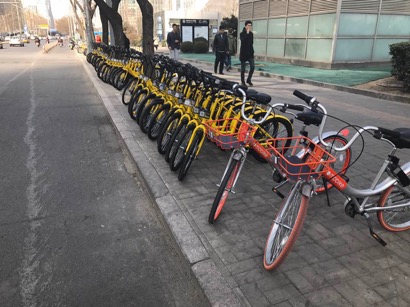(副题)用手机找车、解锁、付费,几乎可以在任何地方停车
北欧绿色邮报网报道(主编陈雪霏)–据人民日报记者 强薇报道
在中国,若是你还不知道什么是“共享单车”,恐怕你已经落伍了。
以摩拜(mobike)、ofo等为代表的共享单车去年开始在中国迎来了爆发式增长。找车、解锁、付费,手机全能搞定,随时随地用车还车,方便、快捷、便宜。有数据显示,截至去年底,我国共享单车企业超过20家,车辆数量达几百万辆,用户总数接近1900万人。

 3月1日,共享单车平台ofo宣布完成D轮4.5亿美元(约合人民币31亿元)融资,创下了共享单车行业单笔最高融资纪录,同时成为了行业估值最高的独角兽公司(估值10亿美元以上且创办时间相对较短的公司)。
3月1日,共享单车平台ofo宣布完成D轮4.5亿美元(约合人民币31亿元)融资,创下了共享单车行业单笔最高融资纪录,同时成为了行业估值最高的独角兽公司(估值10亿美元以上且创办时间相对较短的公司)。
在中国的大多数城市,“最后一公里”的公共交通末端需求普遍存在。此前,不少城市发展了公共自行车,但受制于车桩限制、办理手续复杂等问题,使用起来并不那么方便。而新出现的共享单车普遍拥有“无桩”“定位”“扫码即用”这几个特点。以摩拜单车为例,因为不用停车桩,单车几乎可以停在任何地方,用户通过手机app查找离自己最近的单车,扫一下单车上的二维码就可以解锁。到达目的地后上锁付款,平台也能够自动记录下单车的地理位置,方便下一位用户找车。大而言之,共享单车契合了绿色出行、节能减排的倡导;小而言之,共享单车价格实惠,用车方便,所以吸引了众多粉丝。
这些共享单车可谓是共享经济、高科技与现实需求碰撞出的火花。通过这些“小红车”“小黄车”,人们也看到了共享经济的强大实力。据普华永道会计师事务所预测,到2025年,全球共享经济市场规模将达到3350亿美元,较2016年增长逾20倍。
国际知名管理咨询公司麦肯锡最新报告显示,中国的共享经济中,共享出行正快速普及,而共享空间和共享技能方兴未艾。目前中国共享经济已涵盖了共享出行、共享空间、共享技能、共享金融等多个领域,网约车、共享单车、汽车分时租赁、公寓短租等多个细分领域发展较快。
 图片说明:在北京CBD核心区,成排的共享单车摆放在地铁站旁。
图片说明:在北京CBD核心区,成排的共享单车摆放在地铁站旁。
人民日报记者 强薇摄
China’s bike-sharing industry braces for explosive growth
By Qiang Wei from People’s Daily
China’s bike-sharing industry has embraced an explosive growth since last year. Data showed that by the end of last year, millions of bikes offered by over 20 bike-sharing companies have expanded their service to nearly 19 million users.
The bike-sharing service enables users to find, unlock and pay to rent the bicycles through a smartphone app. Mobike and Ofo are among the two largest of a growing crop of private bike-sharing operators.
Ofo, the company behind the yellow two-wheelers, announced on 1st March that it has raised 3.1 billion yuan ($450 million) in a fresh round of funding. It not only represents the largest single deal in terms of fund raised by a bike-sharing firm, but also swells the firm to the industry’s richest unicorn, a start-up company valued at over 1 billion dollars.
Public bike is not a fresh thing. Many Chinese cities have launched public bikes previously to meet the citizens’ demands for the “last mile” of public transportation, but congested public space and complicated procedures restrained the pace of such efforts.
Unlike the services provided by local governments, users of the newly emerging shared bikes like Orange-hued Mobike can find and pay for bicycles via a smartphone app and then leave them wherever they want. The location of the bike will be recorded by the data platforms, so that the next users can find one easily.
The economical and convenient service also responds to China’s call for green, energy-saving transportation, attracting a host of fans due to its convenience and low price.
These bikes, a combination of sharing-economy, high-technology and market demands, also provide the outside world a glimpse into China’s huge potential in sharing economy.
PwC’s projections show that five key sharing sectors—travel, car sharing, finance, staffing, and music and video streaming—have the potential to increase global revenues to around 335 billion dollars by 2025, over 20 times higher than the number in 2016.
The latest report released by McKinsey & Company on China’s sharing economy revealed that shared transportation is gaining wide popularity in the Chinese market, while office space and technology sharing is rising.
So far, China’s sharing economy is applied in transportation, office space, skills and finance, while segment fields including car-hailing, bike-sharing, car-sharing and apartment-renting are growing in a faster pace.
Shared bikes are lined up outside a subway entrance in CBD in Beijing. (Photo by Qiang Wei from People’s Daily)
